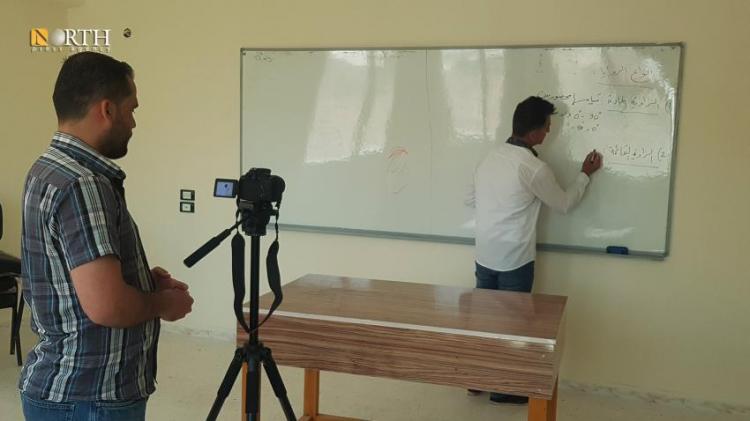Kobani – North-Press Agency
Fattah Issa – Fayad Muhammad
Last Sunday, Kobani University began its second semester this year using the distance learning system, amid many difficulties, most of which are technical difficulties for university students.
On March 14th, the Autonomous Administration in North and East Syria decided to suspend working hours in all schools, institutes and universities until further notice in order to counter the threat of the spread of coronavirus.
Difficulties
Marwan Ahmad, a first year student at the College of Science at the University of Kobani, said that they face difficulties with learning from home via the Internet due to the bad network connection, the size of programs used in education that are not compatible with all students’ mobile devices, and problems related to power outages.
Ahmad prefers the traditional education system, where students ask the lecturer or teacher about any points that they do not understand and benefit the rest of the students, noting that asking lecturers questions via comments is a stiff interaction.
Online education
Vice President of Kobani University Sherine Muslim, told North-Press that the distance learning system relies in its first stage on the use of three applications: Zoom, Telegram, and Google Classroom.
The lessons are recorded as video clips, where students participate in the classroom platform and the videos are sent to them according to a program specified by the university administration.
Muslim indicated that the university would have used only Zoom application, which is somewhat similar to live lessons, but difficulties related to power outages and internet problems forced the university’s administration to record videos and send them to students later, provided that lecturers continue their lessons with students through communication programs.
The second stage of distance learning includes assessment, which will be via the Zoom application, where the lecturer can see the students' level by conducting tests for them, and evaluate them during their participation in the lectures through the distance learning system, in addition to presenting projects related to their studies.
Additional time will be allocated by teachers and lecturers at the university to answer students’ questions and inquiries through the new system.
The duration of the second semester is approximately four months, starting from May 3rd and ending on the 29th of August, according to the vice president of the University of Kobani.
The University of Kobani has several colleges, which are the College of Arts, which includes the Kurdish literature department, and the College of Sciences, which includes the Physics, Chemistry, Mathematics, and Science Departments, in addition to the Medical Laboratory Department.
Regarding the scientific subjects that require laboratory experiments, Sherine Muslim said that lecturers would conduct their experiments live in front of students via Zoom, in addition to recording these experiments and sending tem to students who were unable to follow due to the interruption of electricity or the Internet.
Interaction
Lecturer Fadel Fadel in the Department of Mathematics explained that the current situation forced them to teach their lessons via distance learning and Zoom, Telegram and Google Classroom, noting that the interaction with students takes place via these applications after sending the videos to them by answering their inquiries and questions.
Fadel acknowledged that interaction in traditional education is better than distance learning, pointing out that they prepare educational files and send them to students, and then evaluate and test them using these applications.
History teacher and administrator in the Kurdish Literature Department Aqid Nasro said that the way to present a lecture differs from one lesson to another, as some lectures can be given through dialogue and discussion, while other lectures need to use a whiteboard.
Nasro pointed out that the distance learning system is new to students and lecturers at the same time, and that they will face difficulties in its early stages, but these problems will be gradually resolved.
Nasro added: "It is not possible to evaluate the distance learning now as it is a new system and it needs time for lecturers and students to evaluate it," noting that the success of the experiment depends on how serious the students are in following their lessons remotely, which is different from the traditional lectures in which the lecturer has a major role in controlling the attention of students to follow up on the lecture.
The number of students at the University of Kobani is about 400 in the past three years, supervised by more than 25 teachers and lecturers, according to the university administration.

